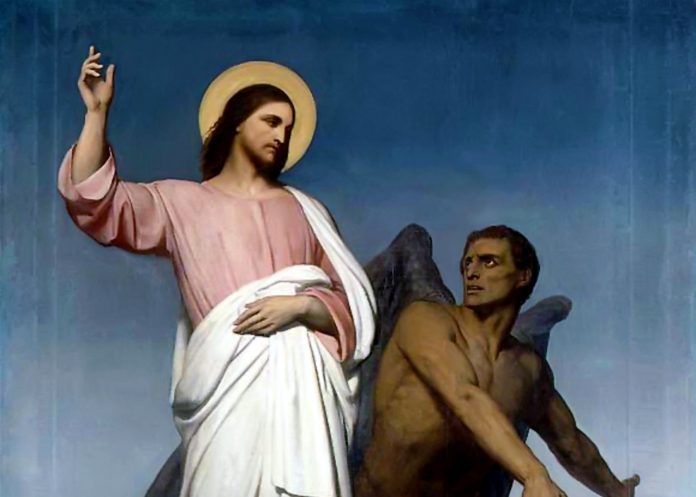Reflection for the 1st Sunday of Lent (Cycle C)
The tale of the temptation of the Christ has long been interpreted as the three attempts on our Lord to abandon his service for the kingdom of God in exchange for an instantaneous yet questionable claim on the kingdom itself. It is written in parallel to the same literary framework as the temptation of ha-adam in the Genesis narrative in which the way of obedience and oblation towards glory, is rejected through a deceptive offer of the same glory by disobedience, rebellion and self-promotion. Hence, a classic story of the tension and the human dilemma between selflessness and selfishness, is retold in the Gospel as a lesson that such temptations may be overcome.
These three attempts on Jesus are often compared to the three denials by Peter of the Christ during the Passion drama and subsequently, his three declarations of love for his risen Master at the holy apparition by the lake of Tiberias. The lessons in these pericopes from the Gospel attributed to John, may be understood that if and when we do succumb to temptations, we will without any exception, be redeemed from our folly, if and when we begin to do as Paul advises: “You are saved, if you confess with your lips that Jesus is Lord, and, in your heart, you believe that God raised him from the dead. By believing from the heart, you obtain true righteousness; by confessing the faith with your lips, you are saved.”
So, our re-creation from our fall is initiated by a humble acceptance of the divine reality that for our sake, the Spirit acted first: Our undeserving ascent from a deserved descent from Love, has been commenced and fulfilled by Love itself; the Creator God whom we ignored, fought against and hated, has become our Savior and Sanctifier.
In the reading from Deuteronomy, in a recollection of the Hebrews’ historical humiliation and suffering through liturgical prayers and offerings, it is clear that the spiritual awakening of ha-adam has to begin and will evolve through a “bottom-up” configuration: It is from the state of being “at the bottom” from which God raises us up; we must depend on him for this raising-up, because we can never raise ourselves up. It is in this context of singular dependence on God that genuine gratitude flows, symbolized in the scriptural reading by the offering on the altar of the “first fruits” of prosperity; without an understanding of this dependence, a sincere “thank you” cannot exist. In fact, ‘non-dependence’ or independence can lead or has led towards the rejection of God himself.
Holiness, or “true righteousness, coming from faith,” is therefore an undeserved gift rather than the object of an “exchange between the human and the divine.” The evil one is persistently tempting us, as it did with Jesus in the solitude of the desert, to think and act only for ourselves, “People cannot live on bread alone;” to think and act as if “power and wealth” already belongs to us and can without difficulty, be given to those who desire to demand for it, “You shall worship the Lord your God and serve him alone;” and to think and act as if “by doing everything for God,” he will “most certainly be obliged to meet our expectations” for divine protection and reward, “You shall not challenge the Lord your God.” A life of holiness does not follow a path from self-veneration, to self-upliftment, to a “transaction with God” as if we are “equal to him;” “power and wealth” belongs only to God, and is bestowed by him only upon those who never asked for it.
Holiness instead goes through a process of remembering our forsakenness, of being “far from God” because “we have miserably failed him;” of then understanding that we are in need of mercy and compassion, which we hope he extends to us who are undeserving; and of receiving the undeserved gifts of faith and holiness, upon which our consequent joy and gratitude is made manifest through proper worship and service for the kingdom of justice and peace. We must not challenge our Abba to give us “what we deserve or earned;” rather we must be challenged to be fully open to his mystery, to allow ourselves to be surprised and made happy by whatever he chooses to give us, if we are to be given anything at all; to be gifted with the unexpected; and to respond with humble fervor to such graces, which we can never hope to repay.
Brother Jess Matias is a professed brother of the Secular Franciscan Order. He serves as minister of the St. Pio of Pietrelcina Fraternity at St. Francis of Assisi Parish in Mandaluyong City, coordinator of the Padre Pio Prayer Groups of the Capuchins in the Philippines and prison counselor and catechist for the Bureau of Jail Management and Penology.
The views expressed in this article are the opinions of the author and do not necessarily reflect the editorial stance of LiCAS.news.









